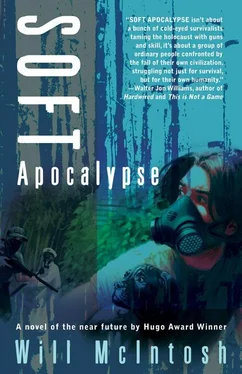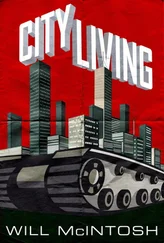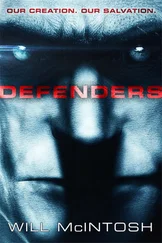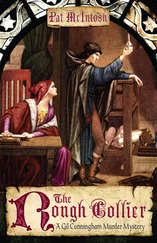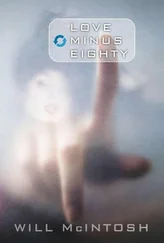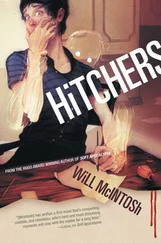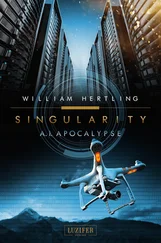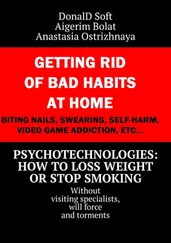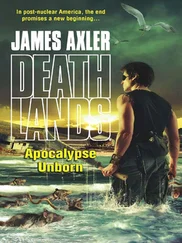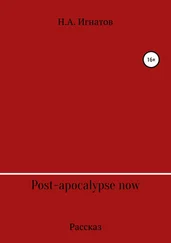“Two times after that, I left Mom somewhere, telling her I was going to buy food. Then I would approach a man with food and offer sex for food.
“The last time, the man did it, then called me a whore and threw me out without giving me the food.”
Phoebe wiped something from the side of her nose with a trembling hand. I wanted her to look up, to see that I was hearing her, that I wasn’t judging her, that she’d done nothing wrong, but she kept her eyes on her sneakers.
“When I went back to my mother that last time, she told me that she had figured out what I was doing to get the food. She said it was disgusting. When I asked her if she’d rather starve, she said yes, she’d rather starve.
“The next time we stopped, I sat her in the shade under a tree…” Fresh tears rolled down her cheeks; her shoulders heaved. “I told her I was going to look for food.” She struggled to get the words out. “And I left her.”
She looked up at me. “I left my mother.”
I nodded, simply nodded understanding. I wasn’t sure how to respond, didn’t trust myself to respond, because it seemed like any response would be either trite or judgmental.
She leaned back in the little seat, looked up at the wood-slatted ceiling, her cheeks wet with tears. “She walked so damned slowly . Each step seemed to require this huge effort. So I left her.” She sniffed, wiped her nose on the sleeve of her sweater. “Half a day later I couldn’t stand the guilt any longer and I went back to look for her, but she was gone.”
I had to respond; I couldn’t leave her hanging there on those words, but I felt like I’d been struck mute. So I reached over and hugged her. She hugged me back, tightly, and we went on hugging until it wasn’t a hug any more, it was more like a seated slow dance. I rocked her ever so slightly while she cried into my neck.
Finally, we separated, looking off into the mad decay of the carnival. I peered up into the steel framework of the Ferris wheel towering nearby, a series of shrinking Xs, thinking about the courage it had taken for Phoebe to tell me what she had just told me, and realized what my response should be.
I took a ragged breath, and began my own story. “One day two years ago I got it in my head to steal a pig from a farm.” I choked up almost immediately. I wondered how I would get through the story if I couldn’t even make it through the first sentence.
I did get through it, though. I told her what really happened to Ange, something I’d never told another living soul. I cried through most of it, but when it was out the relief I felt surprised me.
I didn’t stop there. I told her about how Cortez had killed Tara Cohn, and my part in that, and the time we stabbed the men who were raping Ange, and got through both of those without any tears. I was all cried out, and besides, awful as they were, neither of those events tortured me the way Ange’s death did.
We just sat for a while then. I felt drained to the point of numbness.
“I love the word ‘calliope,’” Phoebe finally said, sounding far away. “It’s so festive.”
“Mmm,” I said.
“But it’s not a cheap, simple, primary-color sort of festive, like ‘confetti’ is.”
“No. Never.”
Phoebe fidgeted with a button on her shirt, her gaze far away. She had such beautiful, delicate wrists. “When we went on that date all those years ago, I was a virgin. I was a virgin until I was twenty-six,” she said. “That’s who I am.”
“That not hard to believe, given the sweaters and all.”
Phoebe laughed. “I can’t help wondering, though: is that really who I am? I never thought I was capable of doing what I did to my mother. Now that I know I am, how can I still think of myself as the person I thought I was?”
I nodded understanding. “You wonder if doing something awful makes you an awful person, even if you didn’t have a choice,” I said.
“Yeah.”
“I’m so afraid sometimes, that this world has turned me into a monster, capable of horrible things. Or it’s exposed me for the monster I am.”
“Yeah, that’s it. Exactly.”
Someone had gone through and smashed a lot of the mirrors in the Hall of Mirrors. Outside, the facade was painted with huge clown faces. One had a long, pointed head, another, a fat round one.
We went on talking—about our fears, about the pain we felt for the things we’d done. It felt good to have someone listen without judging.
We didn’t realize how late it was getting until the light began to wane. Phoebe raised her arms over head and stretched. As she did so one of her nipples was just barely visible through her shirt. It was like glimpsing a rare bird, obscured by thick foliage and then gone as she dropped her arms. She was a beautiful woman. I wondered if my capacity to love wasn’t as far from the surface as I thought. Maybe I was afraid of those feelings, or embarrassed by them, or felt guilty about having them. Or all of the above.
“I can’t handle any more emotion in my life,” Phoebe said, as if reading my thoughts. “My tank is empty. I can’t handle any more love, no more tearful breakups.”
“Me neither,” I said.
She looked at me with those turtle green eyes. I leaned over and kissed her, lightly, almost not at all. I didn’t intend to do it—I just did, without thinking. To my surprise, Phoebe didn’t protest. To my further surprise, a light spring breeze blew through me, lifting me just high enough to see beyond the despair I’d felt for so long I could barely remember ever feeling anything else.
Neither of us said anything. We headed back as if it hadn’t happened.
On the walk back I realized that in my entire life I’d never had a conversation like the one I’d just had with Phoebe. I hadn’t even been able to talk like that with Ange.
I was staring at a wall of thick kudzu and suddenly realized that there was an entire house hidden in that tangle of green. A wren squeezed into a crack between the slats just below the roofline. Looking further off, I spotted another house.
“Did anyone notice that there are houses right there?” I asked, pointing.
Everyone turned and looked. Phoebe laughed. “I hadn’t noticed.”
We’d spent the night sleeping outside, thirty feet from shelter. I finished rolling up my bedding, stuffed it into the duffel bag I’d salvaged at one house or another.
Phoebe was putting away her knickknacks. Each night we seemed to lay out our bedding a little closer together.
“How did your parents die?” Phoebe asked.
“In the water riots in ’21,” I said. “I don’t know the specifics, just that they were alive before the riots and weren’t after.” I plucked a bamboo shoot off a stalk, twisted it between two fingers. “How did your father die?”
“My mother said he choked on a chicken bone.”
“Wow.” It seemed an anachronistic death. But even with all the awful ways to die these days, I guess some people still choked on chicken bones.
“We should get moving,” Cortez called out.
“Whatever you say, boss,” Colin called back. Cortez gave him a “don’t make me kick your ass” look.
I shrugged on my pack. It felt a little heavier each day we continued on our survivalist diet.
Two men ambled out of the brush. One was dressed head to toe in camouflage, the other in a crisp, white Atlanta Braves baseball uniform. Each cradled an assault rifle in one hand.
“What have we got here?” the guy in camouflage asked. His close-set eyes were nearly hidden by a wiry black beard.
“We’re just passing through,” Cortez said.
“Yeah? To where?” the one in the baseball uniform asked. It reminded me of a Jumpy-Jump outfit. Had the Jumpy-Jumps made it this far out of the city? Anything was possible. He went over and pulled the corner off the tarp we’d tied over one of the big packs that held our community property. He had a meaty bully’s face, the kind of guy who was a second string linebacker on his podunk high school’s football team and never got the girl.
Читать дальше
